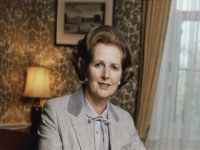
Lady Thatcher - a journey from boom to bust

Margaret Thatcher, or Lady Thatcher of Grantham for the British population, passed away at 11.00 today after suffering a stroke at 87 years of age. If her trump cards were her energy and her obduracy, the characteristics which were to see her make her mark as the first female Prime Minister of the UK, they would also lead her to take unpopular decisions which would lead to her downfall.
Margaret Thatcher had two facets - an external image and an internal one. Marrying the two together, taking the person in her historical context and avoiding the temptation to stick the knife into the back of a dead person, as so many are now doing on the Internet, we can arrive at an objective appraisal of this controversial politician but doubtlessly a great leader of her people.
The external image was summed up by the nickname Iron Lady, given to her by the Soviet journalist Captain Yuri Gavrilov, writing in the Red Star newspaper before she came to power, in 1976 - it was an image of intransigence and belligerence against the Soviet Union and ideologies to the left of her own beloved Conservatism.
This characteristic was to lead the United Kingdom to reclaim the Falklands and South Georgia Islands after President Galtieri of Argentina had ordered his armed forces to seize them in 1982, a characteristic and a feat which was to give her political legitimacy, internally, for the rest of her mandate and the rest of the decade (after election in 1979, re-election in 1983 and 1987, all with absolute majorities).
If in many ways the Thatcher decade was the one in which the most unpleasant attributes of governance (arrogance) and of British society (the yob, the yuppie and the hooligan) became more visible from a national viewpoint, one has to take this decade in the context with what went before and what came after it.
Margaret Thatcher took hold of the reins of the UK after the dark years in which Britain was termed "The sick man of Europe" less than two decades after the disappearance of its Empire. It was country in need of direction, a country in need of values. Margaret Thatcher, coming from that Middle England of Victorian values, hard work and charity, managed to instill a sense of national confidence and for some, put the Great back into Britain.
Whether one agrees with her politics or not, whether one stands by social policies which saw the heart of Britain ripped out, old social values being cast into the fire, social turbulence a mainstay of British life, a symptom of disrespect for the poor and for the Unions, the fact is that in 1990, nobody was calling Britain the "sick man" any more, although evidently there were larger vectors at play in a totally different international socio-economic scenario.
The personal characteristics which led her to power and to impose her vision for Britain in the 1980s would eventually lead her to the pinnacle of political near-sightedness, the Poll Tax, basically, and put in simple terms, an implementation of blind monetarism at the municipal level.
If the Thatcher Decade was one synonymous with unemployment of three million, the worst figure since the 1930s, the euphoria which came with the Falklands War (luckily for the UK President Galtieri did not attack the British fleet with Exocet missiles while it was on the high seas) had faded by 1990, giving way to unease, unrest and in many quarters, a sullen hatred, leading her Conservative Party to disown her in November 1990, calling for a leadership challenge during which she resigned.
The history book writes itself in bold letters and concentrates on generalisms, not details. This is why Margaret Thatcher will be remembered as one of the most influential Great British Prime Ministers, albeit with questions as to whether she was a great Prime Minister. Whatever the case, she remained loyal to her own values and fought for her ideals. Right or wrong, she will be remembered as one who stood up for her beliefs and who did so in an honest and forthright manner.
Timothy Bancroft-Hinchey
Pravda.Ru